Story of Hope: Elisabeth
Published on: January 11, 2024
|
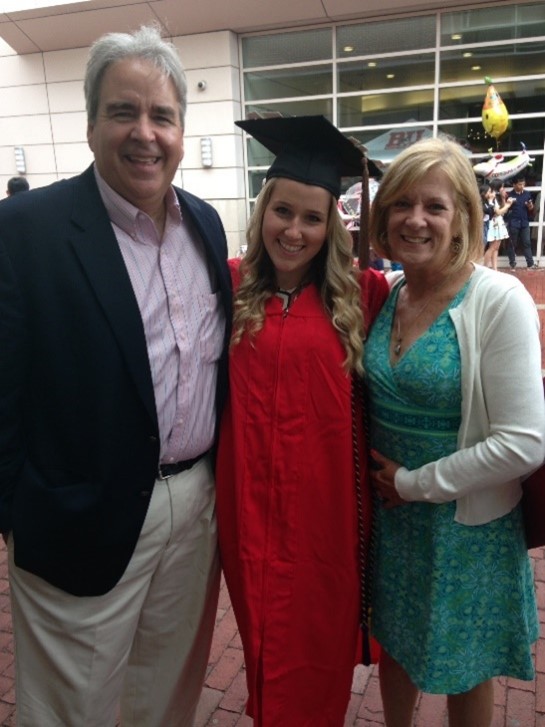 Elisabeth celebrating her graduation with her parents Elisabeth celebrating her graduation with her parents
|
In September 2013 I was entering my senior year at Boston University, and although I had already secured a position with PricewaterhouseCoopers (PwC) post-graduation, I still had a difficult year ahead of me. I was taking extra classes to obtain eligibility to become a certified public accountant, working as a nanny after class five days a week, and assisting with the bookkeeping for my professor’s restaurant. By the time spring rolled around, I was very ready to graduate, move closer to home, and focus on my career.
On May 16, 2014, my mother, father, three sisters and their families made the 6-hour road trip to Boston to see me cross the stage and secure a diploma. Later that evening, we attended a baseball game at Fenway Park. Growing up, we would take road trips up to New England often to see our family friends, the Jameses. My dad and Mr. James were huge Red Sox fans, so we always made it a point to catch a game with them when we were in town. Since all those visits and Sox games were part of the reason I chose Boston for college, it only made sense to have our celebrations continue at Fenway.
A rain delay postponed the game, so my mom and two of my sisters took their kids home to get some rest—but I stuck it out to finish the game with my dad, sister (Sarah), and brother-in-laws. We ate some Fenway franks and belted along with the crowd when “Sweet Caroline” came on in the middle of the 8th inning. All three of us were in a state of pure joy. Sarah and I were just happy to be together as we’d spent the last seven years attending schools in different states and my father was on his own cloud 9. His fourth and last daughter had now graduated college and he was celebrating at one of his favorite places in the world. It didn’t even phase us that we had just witnessed one of the most boring baseball games with the Sox losing to the Detroit Tigers, 1-to-0.
|
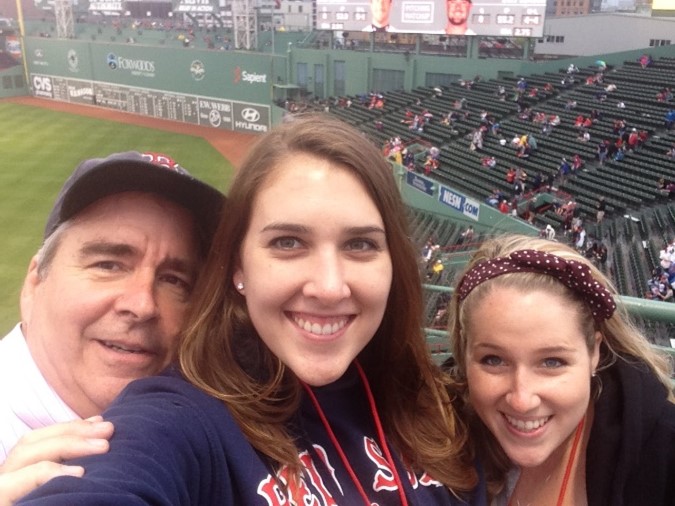 Elisabeth enjoying the game with her sister and father Elisabeth enjoying the game with her sister and father
|
As the game ended, we headed towards the elevator since our seats were located on the 4th floor. Channeling this excitement, I jumped up to hug my dad from behind. When I came down from his back, I bumped the elevator door. Rather than uphold my weight, the door swung in, similar to how a doggie door opens. I descended roughly 30 feet landing on top of the elevator car, which was on the first floor at the time. The door swung shut behind me and it was as if I had disappeared into thin air. My family went into panic mode very quickly. Sarah sprinted down the stairs to stop other patrons from operating the elevator and to get help. Fenway staff had the power cut off to the elevator and first responders including members of Boston EMT, Police and Fire departments were quickly on the scene.
I was alone in the elevator shaft for roughly thirty minutes, with first responders working to secure the elevator. My family was in pure agony, knowing what the outcome would be if I wasn’t able to breathe on my own. Thankfully, the responders were able to descend into the elevator on ropes to safely get me out of the shaft and on my way to Beth Israel Deaconess Hospital. Although I was breathing on my own initially, I was unconscious and was placed on a breathing machine. I was sedated for comfort while intubated, but when they paused the sedating medications I was not responding and the team was concerned about a traumatic brain injury. Sedation was resumed, and according to my family, I remained in the induced coma for five days. It was clear from the injuries to my jaw that my head took the brunt of the fall. X-rays confirmed that there was an open mandibular fracture and a few shattered teeth, along with some minor facial fractures. A CT scan revealed vertebral fractures and several kinds of brain injuries in the right hemisphere. There was blood outside the brain (subarachnoid hemorrhage), in the fluid filled spaces of the brain (intraventricular hemorrhage), and tearing of the brain fibers (diffuse axonal injury). My left lung was collapsed from a pneumothorax, and I had to have a chest tube placed to allow the lung to re-expand. After undergoing all these tests and initial assessments, I was moved up to the ICU.
|
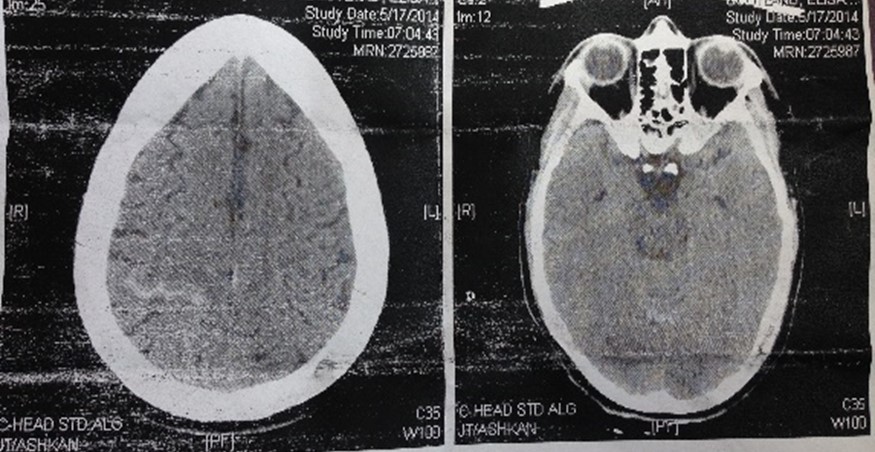 Copy of the initial CT Head Copy of the initial CT Head
|
For the first 48 hours, my family barely left my side. They took shifts to get food but there were still so many questions at the time and no one felt comfortable leaving. Since it was such a large crowd, most of them stayed in the waiting room until I was moved up to the ICU. Here, they were able to stand by and watch for any signs of improvement, a wiggle of the toes or some pressure with my thumb. The nurses kept assuring them that I was getting better but that it would take time for the swelling in my brain to dissipate. By the third day, my father begged the nurses to ease up on my sedation so that I would have the opportunity to awaken on my own for a brief time. As my family gathered around me praying, it was in that short window of time that I opened my eyes for the first time. My eldest sister remembers this moment vividly as she recalls that it didn’t look like “Lizzy” in the gaze I held, but it was enough reassurance that I was still in there. After meeting with the doctor in charge of my overall care and receiving some additional assurance that I was stable, my family left the hospital to get some much needed rest. They knew I was in good hands with the staff at Beth Israel.
***
The weeks to follow would be filled with a rollercoaster ride filled with highs and lows. By Monday, May 19th, I was improving from the brain injury, so the team decided it was time to address getting my jaw repaired. During the surgery, they discovered that I had sustained a puncture that left an open wound from under my jaw straight through to my tongue. Dr. Chigurupati, my oral surgeon, used this opening to place a c-shaped plate across the front lower part of my jaw to hold the bones in place. In order to undergo these necessary surgical repairs, I had a tracheostomy performed to replace the breathing tube in my mouth and a PEG tube placed to allow me to receive nutrition. Although the surgery was successful and Dr. C was very pleased with her work, the recovery seemed to come with some setbacks. Due to the exhaustion and medications needed to keep me out of pain, I was having difficulty performing any of the commands that I had been able to do just two days prior and was kept very sedated. Nurses at Beth Israel such as Cara, Patty, Beth, Maureen (Mo), and Jared continued to take such great care of me. Cara even washed my hair and braided it every shift so that I would be able to keep my long hair.
Almost a week after the accident I was starting to flail my legs around, which is apparently a common response after brain injury, and I was able to be moved to a chair rather than the bed for the first time. As I started to wake up in the ICU, one thing became clear. This was not a scene from a movie where the patient wakes up after months in a coma and is immediately acting like themselves. My family describes my awakening as a rebirth, where I slowly went through each age and stage of life again. I quickly started working with both physical and occupational therapists, who would help in my recovery. After spending seven days in the ICU, I was moved to the surgical floor. It may or may not be a coincidence, but this happened to be the same day the Red Sox ended the 10-game losing streak they’d been on since my accident.
By the time I moved to the surgical floor, I was in my toddler phase of recovery. I vaguely remember feeling disoriented and wondering who the "sit in" nurses in my room were but I'm not sure if these are personal memories or based on stories others told me. Similar to when I was an actual toddler, we definitely had some “terrible two’s” moments. For my safety, I had a 1-to-1 assistant when my family was not there. I even slept in a “Posey Bed,” which was essentially a large green tent wrapped around a hospital bed. Despite being under 24/7 supervision, I still found a way to pull my PICC line out. As I started to learn to communicate again, I still wasn’t able to speak because of the trach. My family brought in my computer and I started to slowly type out a few words. While these were great signs of recovery, the next steps were unclear. My family learned that recovery time was going to be a lot longer than initially expected and that I wouldn’t be able to be moved back to New Jersey for a matter of weeks to months. Ultimately, it was determined that the best place for my recovery would be across town at Spaulding Rehabilitation center, a newer acute rehabilitation facility located in the seaport of Boston.
***
On May 29th, 14 days after my injury, I was transferred by ambulance to rehab. While I had started walking to and from the bathroom with assistance, identifying family members, and listening to music to lift my spirits at Beth Israel, I really honed in on all of these activities and more at Spaulding. Over the next few weeks, I would undergo physical, occupational, and speech therapy each day. During physical therapy I worked with mounted parallel bars to improve my balance and upper body strength. Shortly after I arrived at Spaulding, the therapists identified that my ability to walk and perform fine motor skill activities was being inhibited by a cranial nerve palsy that caused double vision and issues with depth perception, which is to say my eyes weren’t moving properly. I was given a pair of nonprescription glasses with prisms on the lenses. The prisms were supposed to help align images so that I could see things more clearly. Since I only had double vision in the lower quadrants of my vision, the prisms were attached only at the bottom of the lenses, and I quickly adapted to looking over the prisms instead of through them. Either way, it helped avoid double vision and I started progressing with my therapies. The following week I was able to join a group activity bike ride that took place outside the therapy facility on adaptive bikes.
|
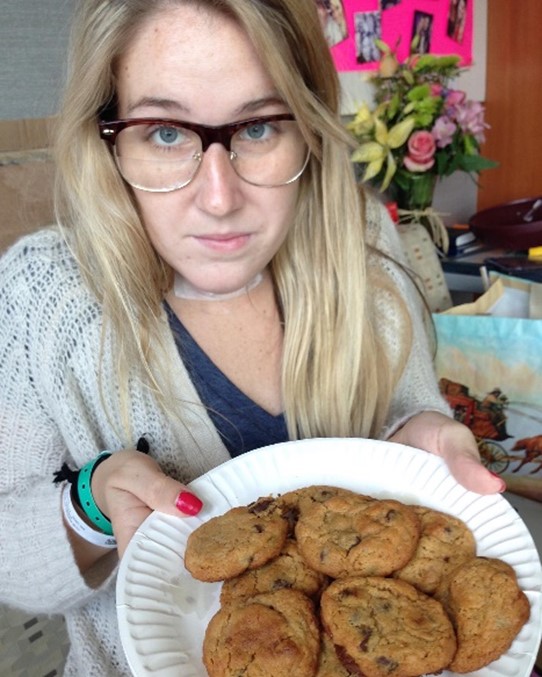
|
Typically, when you think of occupational therapy, you might think of a therapy that helps individuals with the things they’ll need to do on a daily basis, such as work, school, hobbies, or household tasks. While occupational therapy achieved these goals in the end, the primary focus early on was helping me remember who I was. One of my biggest ongoing issues was my memory. When I first got to Spaulding, they had me fill out a sheet where they asked me my favorite movie, my address, and the names of my siblings. I got most of them wrong. My memory for big events was completely gone for the three months leading up to the accident. With the help of one of my best friends, Caroline, my family started a journal of activities I had participated in during senior week the week prior to my accident so that I could read the journal and remind myself later. Early on, my parents started going over what had happened to me and how I ended up at Beth Israel and then Spaulding. Since my short term memory was also affected, I would have to be reminded often. At Spaulding, they found additional ways to help me recall who I was prior to the accident. One day, we visited a test kitchen in the facility and baked a batch of chocolate chip cookies from scratch. Baking had always been something I loved to do so I think this really helped center me. According to the journal my family kept, the day I spent baking was the first day I actually started saying that I felt “alive” since the accident.
Speech therapy was probably one of the most necessary and impactful of the three disciplines. It had been two weeks since my accident and I was still unable to use my voice. At the time, everyone was unsure if my vocal cords had been injured during intubation or if it was just the placement of the trach that was making it difficult to form words. My speech therapists, Jenna and Brian, were able to use music to retrain me to speak. Brian would strum along on his guitar and have me breathe in to a number of beats and then hum as I breathed out. After my very first session with him I managed to say “mom,” then “good morning” three days later, and by the fourth day, I spent the session singing “Trouble” by Taylor Swift.
After passing a few more tests like a swallow test and an “independent living test,” it was determined that I could continue these therapies on an outpatient basis closer to home, so I was discharged from Spaulding on June 25th. I was able to enjoy a quick last supper with my friends from Boston before my parents and I started the journey back to Brigantine, New Jersey. Here, I picked back up with my physical, occupational, and speech therapy three times a week for the next six weeks. Once this was completed, I underwent a neuropsychological consultation at Malamut & Moss to determine where I stood and what I needed to focus on. The evaluation indicated that my fine motor speed was still severely impaired at this point, and that there were residual impairments in many areas including visual disturbance, impulsivity, cognitive fatigue, residual memory, disorganization, diminished reading comprehension, and slow reaction time. After the accident, PwC was very understanding and postponed my employment start date until January 2015. Upon receiving these results, I requested to postpone this further so that I could focus on improving these deficits.
In the fall of 2014, I started studying for the CPA exam, along with doing some odd jobs like dog-sitting here and there, but since my driver’s license had been suspended due to the issues with my vision, my options for employment and other activities were quite limited. By November, my neuro-ophthalmologist, Dr. Grant Liu, gave me the clearance to drive. Once I re-tested and renewed my license, I began looking for part time employment to build up mental stamina and improve my executive function. By March 2015, I was working as a secretary at a veterinarian hospital, a human resources assistant at Career Opportunity Development, Inc., and as an assistant for a tax preparer during tax season. This was all while I studied for the FAR portion of the CPA exam. During this time, I was checking in with the NJ Division of Vocational Rehabilitation Services to ensure I was on track for a July start date with PwC.
Upon hearing that I had successfully passed the first part of my CPA exams in April, I was ready to start my journey with PwC in Philadelphia. I moved into a studio right in Center City, just a fifteen-minute walk from the office. Over the next eighteen months, I worked here as I continued to study and take the remaining three parts of the CPA exam. After two years with PwC, I realized the hustle and bustle of busy seasons with long hours and little time for friends and family might not be the life for me. Although accounting had been the safe route, I started looking into a career in baking because it had always been a dream in the back of my mind. I enrolled in a baking and pastry program at the Art Institute of Philadelphia and looked for part time jobs in the industry to gain some experience while I was attending school. My classes at the Art Institute started less than a month after leaving PwC and I began working at J’aime French Bakery shortly after that. I initially obtained a position as a barista at J’aime, but once the owner and chef, Bastien, heard I had goals of becoming a baker, he would have me come in early before my shifts to help in the kitchen as well.
I’m not sure if it was the early mornings (with a 4 AM start!) that deterred me, or just a fear of being out of the industry for too long, but after six months I decided to look for a more suitable job back in the accounting industry. In January 2018, I started with the CPA firm, Morris J. Cohen, MJC, with the hopes of being able to achieve more work-life balance than I had back at PwC. MJC handled a wide variety of clientele and assisted each of them in many facets of business so I was able to gain a lot of great experiences there. I loved working with my colleagues and employers at MJC, but ultimately my path kept veering back to baking.
|
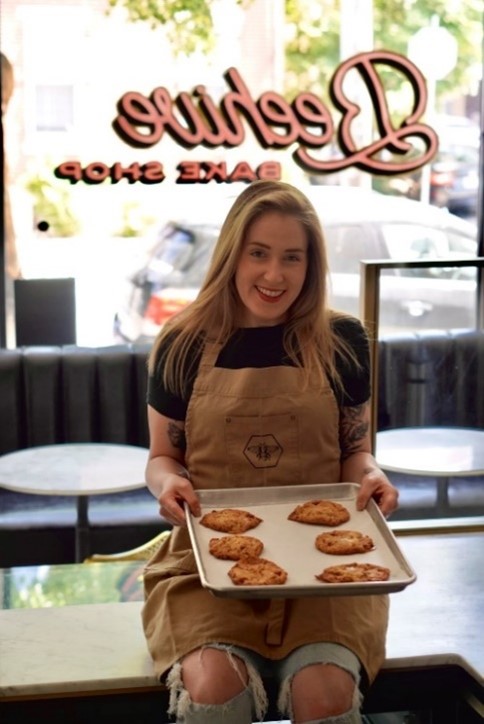
|
In January 2020 I married my husband, Adrian, at what many of our friends and family consider the last fun event of 2020. Shortly after, COVID-19 began to spread across the US. Soon, the only reason we were leaving our apartment was to stock up on essentials from the grocery store. During quarantine, I stayed connected with family and friends by baking, distributing, and celebrating birthdays and other life events through video conferences. Baking was also a good distraction and stress reliever since our homes were now considered the place we ate, drank, slept, and worked. This year really cemented the idea of wanting to pursue baking as a full time career. In November of 2020, I purchased a building with a space that would allow me to do so. I continued working with MJC through April of 2021, but after this point I focused fully on the construction and development of Beehive Bake Shop, which officially opened in November 2021.
After running my own business for almost two years, I still look back to “pre-fall Lizzy” and wonder if she would have had a different path. Remember, impulsivity was indeed one of the residual impairments previously identified. When I forget the baking time and temperature of my favorite cookies or I can’t remember how old my nieces and nephews are, I wonder if these are normal things to forget or if it’s because of memory deficits due to the traumatic brain injury. At the end of the day, I look back and I’m really proud of how far I’ve come from the confused young woman in the hospital bed nine years ago. It certainly would not have been possible without the strong support system my family provided, the thoughtful and intensive care from all of the nurses and doctors I encountered, and a lot of determination on my part.
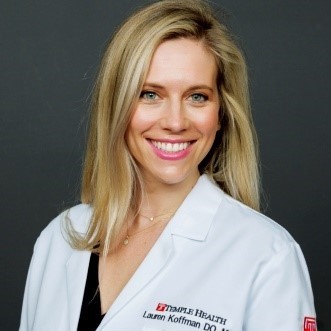
Section Editor
Lauren Koffman, DO, MS